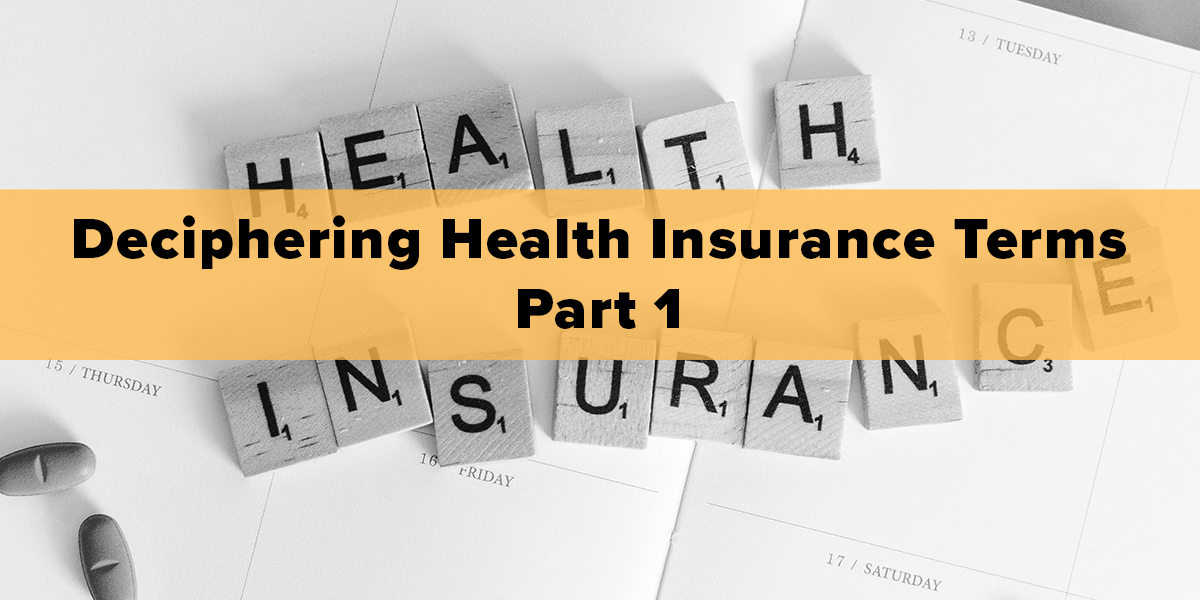If you have ever had to search for your own health care or even try to choose which employee sponsored plan to go with, you know how easily you can get overwhelmed. There can be so many components to weigh and compare. It’s not just a matter going with a name you have heard of like United Health Care or avoiding lesser known companies like Molina Health Care. There are lots of specifics laid out in the description of benefits.
Pretty much everyone has heard the term “deductible,” but many have no idea what “coinsurance” means. If you are starting a health insurance hunt, start with understanding the widely used terms of the insurance world. No one wants to be surprised by unexpected medical bills, especially if it’s because you did not understand your policy. Let us help.
Deductible
The deductible is what most are familiar with, but often do not understand how it works. Sometimes it’s thought that once someone hits their deductible, they will no longer have any financial responsibility. While this is sometimes true, it most often is not. Generally speaking, the deductible is the amount you have to expend before your insurance plan starts paying. It can be a low amount of $500 or much higher like $5,000. There are usually 2 deductible amounts given. One is the individual and the other is for the family. Depending on the size of your family and if anyone has any major illness, you could hit the family max before anyone hits the individual.
Out-of-Pocket Max
“Out-of-pocket max” and all the different aspects that go into it is where things can get more confusing. Once you hit this amount, this is when your plan starts paying 100% of covered benefit costs. (Please note it is “covered benefit costs” and know what that is for your plan) Your out-of-pocket max will generally consist of your deductible, co-insurance and co-payments that you paid. It does not include the monthly premium, services not included in your plan, or amounts over what provider is allowed to charge. Out of pocket maxes can vary greatly and will usually have two different amounts for individual and family, just like deductibles. The lower these numbers are the lower your monthly premium will be. Choosing a plan solely on the deductible, can leave you with lots of bills you may not be prepared for.
Co-Insurance
Simply put, co-insurance is your share of payments on covered services, until you reach your out-of-pocket max. Generally, co-insurance is a fixed percent for the covered service. The percent can vary depending on the type of service. For example, x-rays may have a different percent covered than a hospital stay or lab work. This kicks in after you have reached your deductible.
This is why you can find yourself in shock, if you choose your plan solely on a low deductible. A $500 deductible, but a $10,000 out-of-pocket max, can leave many bills still coming in. 40% of a hospital stay can be quite a chunk of change.
Co-Payment
Co-payment, also known as a co-pay, is similar to co-insurance, but with a couple distinctions. While co-insurance is a percentage paid, a co-pay is a set amount that is established for a type of service. The co-pays can vary greatly between policies, as well as the type of service. For example, your sick doctor visit co-pay could be $25, while your pharmacy co-pay could be $15. Your plan may include a combination of co-pays and co-insurance, so you need to look at it closely.
Another difference is that a co-pay can be a set amount, no matter what. That means while trying to hit your deductible, it could be in place, as well as after you hit your deductible. It also may or may not be included in your out-of-pocket max.
Be Educated
These are just a few terms to get you started in deciphering your health insurance plan. We will have a part 2 of more terms to help you, as well. For an exhaustive list of terms , click this resource. If you are researching employer sponsored plans, do not hesitate to reach out to your Human Resource department at work, to get more clarification. They may not be able to answer all questions, but they can be an asset. For personal plans, working with an agent can also be very beneficial, in helping find the perfect plan for you and/ or your family. You may want to look into secondary insurance, to help cover you more completely. For more information on secondary insurance contact me.
Hopefully, you will not need the insurance, but you will be happy you did your due diligence, if you do.
